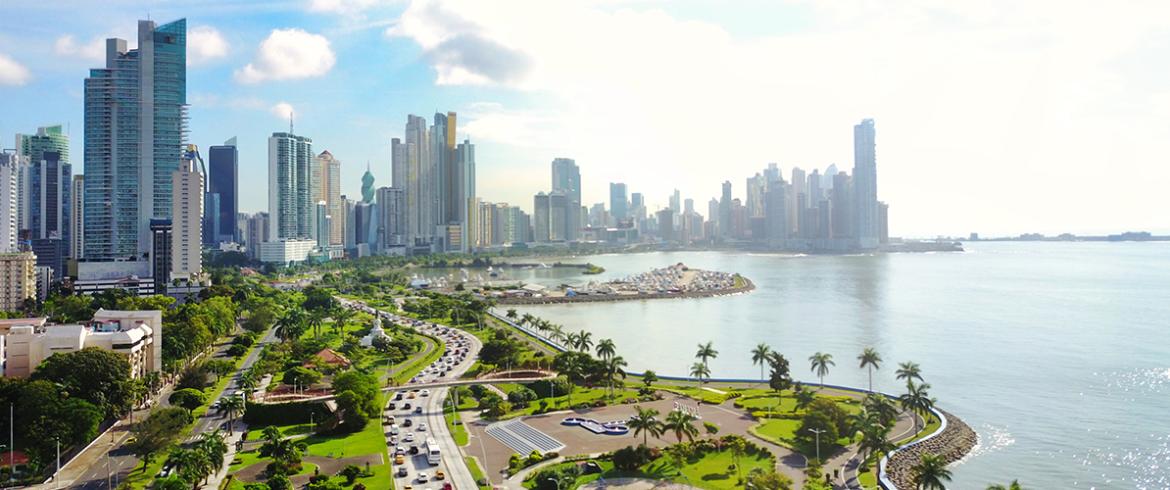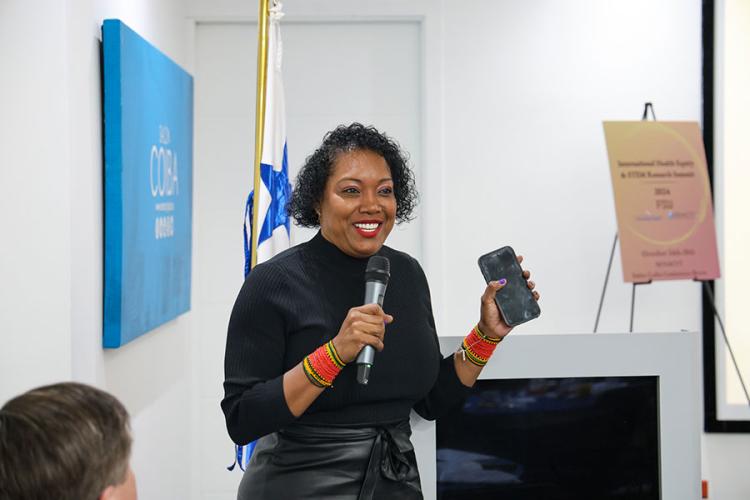
Aerial view of Panama's Skyline showing La Cinta Costera Boulevard (cratervalley for Adobe Stock)
Florida State University’s Center of Population Sciences for Health Equivalence (CPSHE) recently hosted the International Health Equivalence and STEM Research Summit in the Republic of Panama to foster collaborations between researchers, educators and policymakers in Panama and the U.S.
The FAMU-FSU College of Engineering participated in the event to reinforce the engineering pipeline that prepares FSU Panama transfer students for upper-level coursework at the joint college stateside.
The summit, which took place Oct. 14-18 at the National Secretariat of Science, Technology, and Innovation (SENACYT) in the City of Knowledge, Panama City, Panama, highlighted FSU’s significant partnerships with institutions in the region, such as Panama’s Institute of Scientific Research and High Technology Services (INDICASAT-AIP) and the Gorgas Memorial Institute for Health Studies.
With a focus on sustainable solutions for Panama and beyond, the summit aimed to build a global research network that empowers scientists and communities to drive transformative advancements in health equivalence, STEM fields and education. Through cross-cultural collaboration, mentorship programs and student engagement, the summit laid the foundation for international teams to work on impactful projects, including pilot studies, grant proposals and community initiatives.
“At Florida State University, we believe in the power of collaboration to drive meaningful change,” said FSU President Richard McCullough. “FSU has a rich history in the Republic of Panama spanning over 60 years, and this summit is a testament to our commitment to advancing international and STEM education and addressing global health challenges.”
Long-standing partnerships and key collaborators
The summit built on FSU’s presence in Panama for the last 67 years. FSU first arrived in the region in 1957 through a contractual agreement with the U.S. Armed Forces to establish an education center in the former Panama Canal Zone. FSU Panama became a degree-granting branch of FSU in 1967 and moved to its new and current location in the City of Knowledge in 2009. In 2014, FSU Panama was authorized to offer a master’s degree in international affairs. It currently falls under the purview of International Programs at FSU.
“This summit was an incredible opportunity to create partnerships by connecting leaders, administrators and researchers from the different participating institutions in Panama and FSU, which will eventually benefit FSU and the country of Panama,” said Carlos Langoni, rector of FSU Panama.

The summit came to fruition through established relationships between Eugenia Flores Millender, founding co-director of the CPSHE and associate professor in the College of Nursing, and renowned Panamanian researchers like Gabrielle Britton, principal investigator at INDICASAT-AIP’s Center for Neuroscience, and Amanda Gabster, a leading researcher in HIV and epidemiology at the Gorgas Memorial Institute for Health Studies. Their partnership was instrumental in organizing the summit to strengthen international research networks and deepen the existing relationships that continued to evolve.
Millender has a lifelong connection to her homeland, Panama, despite leaving the country at 12. In 2017, Millender decided to bridge the gap between FSU and the Panamanian research community. Her goal was to understand the scientific developments in Panama and create opportunities for collaborative research by linking FSU’s scientists with their counterparts in the country.
Driven by a deep commitment to improving science and health in Panama, Millender saw the strength of strategic alliances as key to accessing funding and fostering impactful research projects. She’s played a pivotal role in solidifying the university’s regional partnerships and advancing shared goals in health equivalence and STEM.
“The strength of this summit lies in the ability to create long-term research relationships that transcended borders,” said Millender, who also co-chaired the summit. “Together, we addressed pressing global health issues by leveraging our collective expertise and commitment to equivalence.”
FSU’s Vice Provost and Chief Strategy Officer Rick Burnette and Assistant Provost for International Initiatives Stephen McDowell also attended the summit. Their presence underscored the university’s commitment to fostering meaningful academic and strategic partnerships in the region and reflected FSU’s dedication to advancing global health equivalence through collaborative research initiatives.
“This summit has been an exceptional opportunity for Florida State University to deepen our partnerships in Panama,” Burnette said. “It’s clear that our presence here offers something unique that sets FSU apart from other institutions, enabling us to replicate and expand our research in a different cultural context. As we move forward, we’ll lean into our international relationships, building on the strong foundation already in place. The value lies in iterating around what’s already working and cultivating trust to create lasting, impactful collaborations.”
Keynote speakers and distinguished guests
The summit welcomed a group of prominent figures from both Panama and the U.S. including Mari Carmen Aponte, U.S. Ambassador to Panama; Dr. Blas Armien, Head of Epidemiology at the Ministry of Health (MINSA); Jorge Arosemena, President of the City of Knowledge; Dr. Julio Sandoval, Panama’s Medical Advisor for the Minister of Health; Dr. Lissette Chang, Country Representative of the CDC Central American and Caribbean Office; Michael Chen, Former Vice-Presidential Candidate of Panama and Past President of the Colón Chamber of Commerce; Dr. Ricardo Lleonart, Director of INDICASAT-AIP; and Dr. Eduardo Ortega-Barría, National Secretary of SENACYT.
Their participation enriched the event with a broad spectrum of perspectives, addressing the complexities of health equivalence, infectious diseases, STEM education and strategic partnerships that foster sustainable development.
An agenda dedicated to innovation and impact
The summit featured various panel discussions, workshops and research presentations on critical topics such as health equivalence, infectious disease threats, STEM education and scientific advancements. Key sessions included debates on policy and research trends, innovative approaches to addressing public health challenges, and discussions on the role of education in bridging health disparities.
Suvranu De, dean of the FAMU-FSU College of Engineering, attended the summit to support STEM education and innovation. He emphasized the summit’s significance in advancing STEM education and research in Panama, noting that it allowed the joint college to engage directly with Panamanian students and institutions to strengthen educational pathways and foster research partnerships.
“When we came in, we had three goals: to serve our undergraduate students from Panama better, to explore educational pathways for the current workforce, and to recruit the best and brightest for our Ph.D. programs,” De said.
De also highlighted the potential for collaborations in areas aligned with the U.S. and Panama’s national priorities, such as energy, transportation, and nearshore opportunities in chip manufacturing, referring to the 2022 CHIPS and Science Act. He expressed optimism for bi-directional partnerships that could enhance STEM innovation in Panama and the United States, positioning FSU as a leader in international research and higher education.
Supporting Panama’s strategic development goals
Through the collaborative efforts initiated at the summit, research institutions from both countries aimed to accelerate advancements in health, science, and technology. By engaging a broad spectrum of stakeholders, including government officials, research institutions, and educators, the event catalyzed meaningful change and supported the sustainable development of health and STEM fields in Panama and beyond.
RELATED ARTICLES
Classmates collaborate to create a more-efficient power cable
